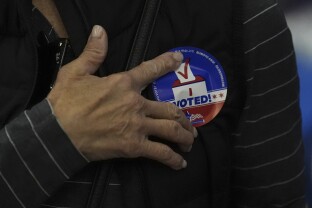As election offices struggle to staff the polls this year out of safety concerns, Illinois voters will be able to weigh in on a measure that would increase penalties for anyone who interferes with election workers’ duties.
The “stolen election” lie from Donald Trump and his supporters has meant that in swing states across the country, election officials are quitting or retiring after facing an onslaught of threats and harassment. Several states will now have ballot measures that look to crack down on illegal and fraudulent voting (even though illegal voting is very rare). But Illinois is the only state that’s asking voters if candidates who “interfere” with official elections should be punished and held responsible.
The measure is a nonbinding “advisory” measure — one of three on this year’s state ballot — but it would help state lawmakers decide if they should move forward with legislation in the future.
State Rep. Jay Hoffman, a Democrat, sponsored the amendment to an unrelated bill that put the questions on the ballot, which passed the legislature and was signed by Gov. JB Pritzker in May. Hoffman said the question, which has no precedent nationally, came from statewide concerns he’d heard about election worker safety.
“Many states are having a hard time, as is Illinois, getting folks who in the past have, for a very small amount of money, worked in the clerk’s offices as they counted the votes, but now are reluctant to do it,” he told NOTUS. “Because they’ve seen some of the reports of intimidation and outright threats and sometimes actual violence against election workers.”
Advisory questions, also known as nonbinding referenda, have made it to ballots in a handful of states mostly in the last four decades. In Illinois, the last use of advisory questions was in 2014, when voters expressed support for raising the minimum wage, and legislators followed through with corresponding policy. This year, legislators filled up the three allotted spaces for advisory questions before any citizen-initiated questions could make it on the ballot.
Matt Dietrich, a spokesperson for the State Board of Elections, told NOTUS that he’s seen a drop in the number of poll workers volunteering since the 2022 midterms. That could be due to several factors, he said, including the pandemic discouraging many retired people from volunteering. But even for paid poll workers, the wages weren’t enough for them to overcome fears about safety.
They have reason to be concerned. This week, the Justice Department unsealed an indictment against a Pennsylvania man charged with threatening a state party election official. Election offices around the country have added panic buttons, bulletproof glass and other security measures in the last few years out of fear. A survey from the Brennan Center for Justice in May found that 38% of local election officials had experienced some kind of threat or harassment because of their jobs, and more than 60% were concerned about pressure from politicians to interfere with their work.
Patrick O’Brian, clerk and recorder in Fulton County, Ill., said he supports the advisory question and his colleagues statewide say the same.
“I don’t think there’s one county clerk in the state that is not in favor of this,” he told NOTUS.
Threatening an election worker is already illegal in 35 states, including Illinois, and in D.C. But the advisory question asks whether civil penalties specifically should be imposed on “candidates who … interfere with or attempt to interfere with election workers’ official duties.” The definitions of interference and official duties, Hoffman said, are vague on purpose and will be defined more clearly in legislation that comes out of the question, should voters affirm it. But his vision is that election interference — by campaigns or individual candidates — would be further punished by damages paid to the affected election workers.
“Hopefully, it would be an additional deterrent to any bad actions against the folks that are actually volunteering or our civil servants who are making sure that we have fair and impartial elections,” Hoffman said.
Alex Gough, a spokesperson for Pritzker, said in a statement that the governor is “proud to stand up for a strong, secure, and accessible democracy.”
“The only goal of anyone who seeks to intimidate their fellow citizens, who have dedicated their time to ensure a smooth voting process, is to undermine the democratic process we all ought to value,” Gough said. “These individuals should be rejected, and their actions have no place in our society.”
—
Helen Huiskes is a reporter at NOTUS and an Allbritton Journalism Institute fellow.
Sign in
Log into your free account with your email. Don’t have one?
Check your email for a one-time code.
We sent a 4-digit code to . Enter the pin to confirm your account.
New code will be available in 1:00
Let’s try this again.
We encountered an error with the passcode sent to . Please reenter your email.


